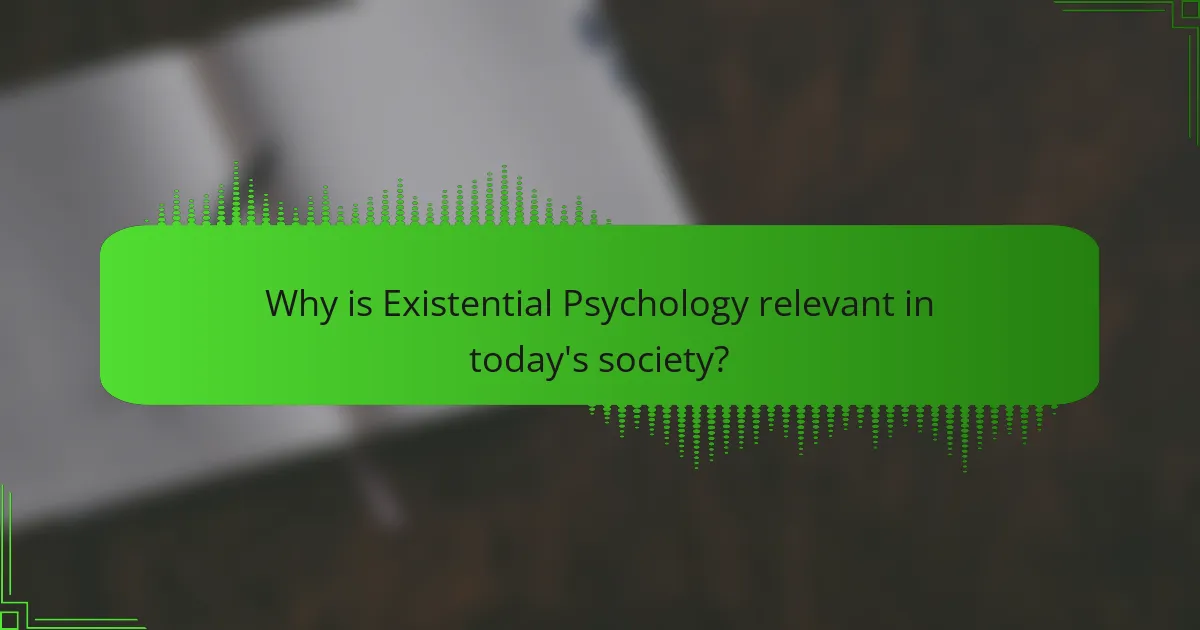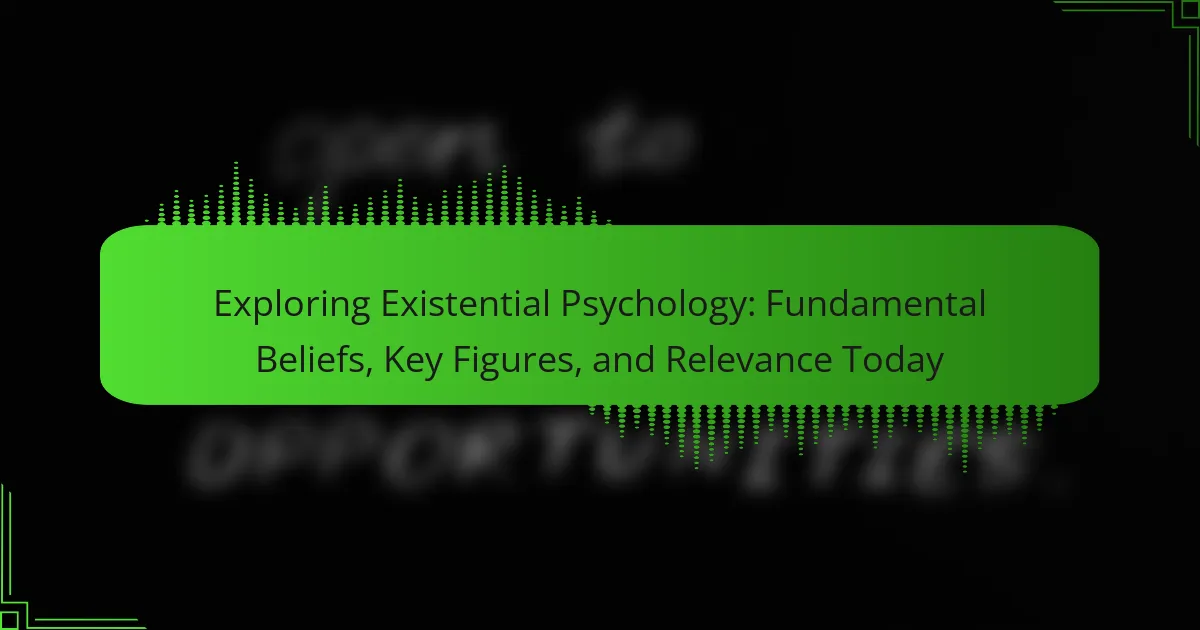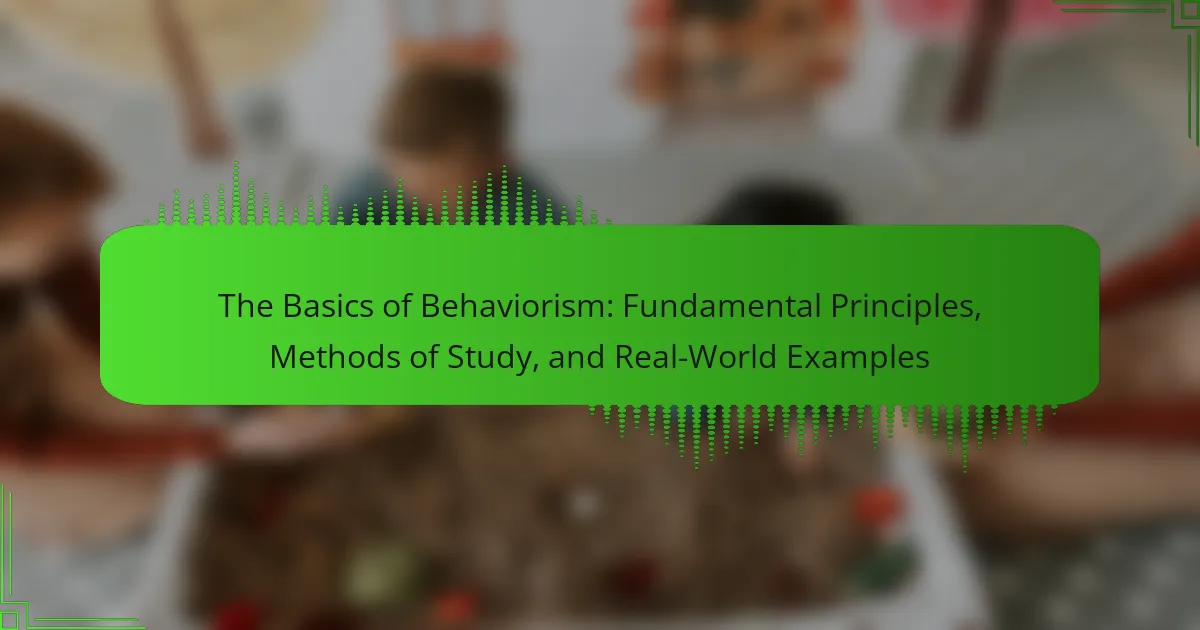Existential psychology is a specialized branch of psychology that examines individual existence, freedom, and choice, focusing on how people derive meaning in their lives despite anxiety and uncertainty. This discipline, rooted in existential philosophy, emphasizes personal responsibility and self-awareness, with key figures like Viktor Frankl highlighting the pursuit of purpose even in suffering. The article explores the relevance of existential psychology in contemporary society, addressing fundamental human concerns such as mortality, isolation, and the quest for meaning, while outlining its practical applications in therapeutic settings for anxiety and depression. Additionally, it discusses how existential therapy fosters emotional resilience and authentic living, making it a valuable approach for navigating modern life’s complexities.

What is Existential Psychology?
Existential psychology is a branch of psychology that focuses on individual existence, freedom, and choice. It explores how people find meaning in their lives amidst anxiety and uncertainty. This discipline emphasizes personal responsibility and the importance of self-awareness. Key figures include Viktor Frankl, who advocated for finding purpose even in suffering. Existential psychology is rooted in existential philosophy, which examines the human condition. It addresses themes like mortality, isolation, and the quest for meaning. This approach is relevant today as individuals seek to navigate complex life challenges.
How does Existential Psychology differ from other psychological approaches?
Existential Psychology differs from other psychological approaches by focusing on individual existence, freedom, and the search for meaning. It emphasizes personal responsibility and the subjective experience of the individual. Unlike behaviorism, which focuses on observable behaviors, or psychoanalysis, which delves into unconscious motives, Existential Psychology prioritizes conscious choices and personal agency. This approach also addresses existential themes such as anxiety, death, and isolation, which are often overlooked by other schools of thought. Notably, key figures like Viktor Frankl and Rollo May have shaped this field by integrating philosophical concepts with psychological practice. Their work illustrates how individuals can find meaning even in suffering, contrasting with more deterministic views in psychology. Existential Psychology’s unique focus on meaning-making sets it apart from traditional therapeutic models.
What are the core principles that define Existential Psychology?
Existential psychology is defined by several core principles. These principles include the emphasis on individual experience, freedom, and choice. It asserts that individuals are responsible for creating meaning in their lives. Existential psychology also recognizes the inherent anxiety of existence. This anxiety arises from the awareness of mortality and the search for purpose. Additionally, it values authenticity and self-awareness. The approach encourages individuals to confront their existence and embrace their true selves. These principles stem from the works of key figures like Viktor Frankl and Rollo May. Their contributions have shaped the understanding of human existence and psychological well-being.
How does Existential Psychology address human experience and existence?
Existential psychology addresses human experience and existence by emphasizing individual freedom and choice. It explores how people create meaning in their lives despite inherent uncertainties. Key concepts include authenticity, anxiety, and the search for purpose. Existential psychologists argue that confronting existential dilemmas leads to personal growth. They focus on subjective experiences rather than objective truths. This approach draws from philosophical roots, particularly existentialism, which values personal agency. Research shows that engaging with existential concerns can enhance psychological well-being. Studies indicate that individuals who reflect on their existence often report greater life satisfaction.
What are the fundamental beliefs of Existential Psychology?
Existential Psychology centers on the belief that individuals create their own meaning in life. It emphasizes personal responsibility and the freedom to choose. This perspective argues that anxiety and despair arise from the confrontation with life’s inherent uncertainties. Existential psychologists assert that understanding one’s existence is crucial for psychological well-being. They highlight the importance of authentic living and self-awareness. Key figures like Viktor Frankl and Rollo May contributed significantly to these beliefs. Frankl’s concept of “will to meaning” illustrates the drive to find purpose. Overall, Existential Psychology seeks to address the human condition and the search for meaning.
Why is the concept of freedom significant in Existential Psychology?
The concept of freedom is significant in Existential Psychology because it emphasizes individual choice and responsibility. This branch of psychology posits that humans are free to make choices that define their existence. Freedom in this context means the ability to act authentically and create one’s own meaning in life. Existential psychologists argue that recognizing this freedom can lead to greater self-awareness and personal growth. For instance, Viktor Frankl highlighted that even in dire circumstances, individuals can choose their attitudes and responses. This perspective encourages people to confront anxiety and despair, ultimately fostering resilience. The significance of freedom is rooted in its potential to empower individuals to live more fulfilling lives.
How does Existential Psychology view the nature of anxiety?
Existential Psychology views anxiety as a fundamental aspect of the human experience. It arises from the individual’s confrontation with the inherent uncertainties of existence. This perspective emphasizes that anxiety is not merely a psychological disorder but a response to the awareness of freedom and responsibility. Existentialists assert that anxiety can lead to personal growth and self-discovery. It reflects the struggle to find meaning in life amidst existential dilemmas. Notably, philosophers like Søren Kierkegaard and Jean-Paul Sartre highlighted anxiety as a catalyst for authentic living. Their works suggest that facing anxiety can enhance one’s understanding of self and existence.
Who are the key figures in Existential Psychology?
Key figures in Existential Psychology include Viktor Frankl, Rollo May, and Irvin D. Yalom. Viktor Frankl is known for developing Logotherapy, emphasizing finding meaning in life. Rollo May contributed to the understanding of anxiety and freedom in human existence. Irvin D. Yalom is recognized for his work on group therapy and existential psychotherapy. These psychologists have significantly shaped the field by integrating existential philosophy with therapeutic practices. Their contributions highlight the importance of meaning, choice, and responsibility in psychological well-being.
What contributions did Viktor Frankl make to Existential Psychology?
Viktor Frankl significantly contributed to Existential Psychology through his development of logotherapy. Logotherapy focuses on finding meaning in life as a central tenet of psychological health. Frankl emphasized that individuals can discover purpose even in suffering. He proposed that meaning can be derived from three primary sources: work, relationships, and suffering. His experiences as a Holocaust survivor informed his theories, highlighting the human capacity for resilience. Frankl’s book, “Man’s Search for Meaning,” has influenced both psychology and philosophy. His ideas have been integrated into therapeutic practices worldwide. Frankl’s work continues to inspire those seeking meaning in their lives.
How did Rollo May shape the understanding of Existential Psychology?
Rollo May significantly shaped the understanding of Existential Psychology by emphasizing the importance of human existence and personal responsibility. He introduced concepts such as anxiety, freedom, and the search for meaning. May argued that anxiety is a natural part of the human experience. He believed it arises from the awareness of one’s freedom and the responsibilities that come with it. His work highlighted the necessity of confronting existential fears to achieve personal growth. May’s ideas were foundational in integrating existential thought into psychological practice. His influential book, “Love and Will,” explored the interplay between love, will, and the human condition. This work helped to bridge the gap between existential philosophy and psychology, making existential concepts accessible to a broader audience.

Why is Existential Psychology relevant in today’s society?
Existential psychology is relevant in today’s society because it addresses fundamental human concerns such as meaning, choice, and anxiety. It provides a framework for understanding the complexities of modern life. Many individuals face existential crises due to rapid societal changes. This branch of psychology helps people navigate feelings of isolation and uncertainty. Research indicates that existential therapy can improve mental well-being by fostering personal responsibility. It encourages individuals to confront their fears and embrace their freedom. The rise of mental health awareness has amplified the importance of existential perspectives. Overall, existential psychology remains crucial as it promotes resilience and self-discovery in contemporary life.
How can Existential Psychology inform modern therapeutic practices?
Existential Psychology can inform modern therapeutic practices by emphasizing individual meaning and personal responsibility. This approach encourages clients to explore their unique existence and confront existential concerns. Therapists can facilitate discussions around freedom, choice, and the search for purpose. Such dialogues can help clients navigate anxiety and depression linked to existential dilemmas. Research shows that this focus enhances self-awareness and personal growth. For example, studies indicate that existential therapy can improve psychological well-being. This evidence supports the integration of existential principles in contemporary therapeutic settings.
What role does Existential Psychology play in addressing contemporary mental health issues?
Existential Psychology plays a crucial role in addressing contemporary mental health issues by focusing on the individual’s search for meaning and self-identity. This branch of psychology emphasizes personal responsibility and the importance of authentic living. It helps individuals confront existential concerns such as isolation, freedom, and mortality. By fostering self-awareness, it encourages individuals to explore their values and beliefs. Research shows that this approach can lead to improved mental health outcomes. Studies indicate that existential therapy can reduce symptoms of anxiety and depression. It provides tools for individuals to cope with life’s challenges effectively. Overall, Existential Psychology offers valuable insights and strategies for navigating modern mental health struggles.
In what ways does Existential Psychology influence personal development?
Existential Psychology influences personal development by emphasizing individual freedom and responsibility. It encourages people to confront their own existence and make authentic choices. This approach fosters self-awareness, helping individuals understand their values and beliefs. It also promotes personal growth through the acceptance of anxiety and uncertainty. By recognizing the inherent meaninglessness of life, individuals can create their own purpose. Research shows that existential therapy can lead to improved mental health outcomes. A study by Yalom and Leszcz in “The Theory and Practice of Group Psychotherapy” highlights how existential themes facilitate personal transformation. Thus, Existential Psychology significantly impacts personal development by guiding individuals toward self-discovery and meaningful living.
How can individuals apply Existential principles to enhance their lives?
Individuals can apply Existential principles to enhance their lives by embracing personal responsibility and authenticity. This means acknowledging that they have the power to shape their own existence. They should reflect on their values and beliefs to live in alignment with their true selves. Engaging in self-exploration can help individuals understand their desires and motivations.
Practicing mindfulness allows individuals to remain present and fully experience life. This enhances their appreciation for the moment and reduces anxiety about the future. Building meaningful relationships fosters connection and combats feelings of isolation.
Additionally, confronting existential anxieties can lead to personal growth. Accepting uncertainty and the inherent struggles of life can foster resilience. Research by Irvin D. Yalom in “Existential Psychotherapy” emphasizes the importance of facing these anxieties for personal development.

What are the practical applications of Existential Psychology?
Existential psychology has several practical applications in therapeutic settings. It helps individuals confront issues of meaning and purpose in their lives. Therapists use existential approaches to facilitate personal growth and self-awareness. This method encourages clients to explore their values and beliefs. Existential psychology is effective in treating anxiety and depression. It provides tools for clients to cope with existential crises. Research indicates that this approach can enhance emotional resilience. Additionally, it promotes authentic living and decision-making.
How can Existential Psychology be integrated into counseling and therapy?
Existential psychology can be integrated into counseling and therapy by focusing on the individual’s search for meaning and self-actualization. Therapists can utilize techniques that encourage clients to explore their values, beliefs, and life choices. This approach emphasizes personal responsibility and the freedom to shape one’s own life.
Existential therapy often involves discussions about death, isolation, freedom, and meaninglessness. These themes help clients confront their anxieties and existential dilemmas. Techniques such as open dialogue and reflective questioning can facilitate deeper self-exploration.
Research indicates that existential therapy can lead to significant improvements in well-being and life satisfaction. A study by Yalom and Leszcz (2005) highlights the effectiveness of existential psychotherapy in addressing issues related to meaning and purpose. Integrating existential principles in therapy fosters a more holistic understanding of the individual.
What techniques derived from Existential Psychology can be used in therapy sessions?
Techniques derived from Existential Psychology that can be used in therapy sessions include existential exploration, meaning-making, and authentic engagement. Existential exploration encourages clients to confront their freedom and responsibility in life. This technique helps individuals recognize their ability to make choices and the impact of those choices on their existence. Meaning-making involves assisting clients in finding personal significance in their experiences. This can lead to deeper insights and a clearer sense of purpose. Authentic engagement emphasizes the importance of genuine relationships in therapy. This technique fosters trust and openness between the therapist and client, enhancing the therapeutic alliance. Research supports these techniques as effective in promoting personal growth and self-awareness in clients.
What are some common misconceptions about Existential Psychology?
Existential psychology is often misunderstood as solely focused on despair and nihilism. Many believe it promotes a pessimistic view of life. In reality, existential psychology emphasizes personal meaning and the search for purpose. It acknowledges human anxiety but encourages individuals to confront it constructively. Another misconception is that it lacks scientific rigor. Existential psychology integrates empirical research with philosophical concepts. Additionally, some think it is only relevant to mental illness. However, it applies to personal development and well-being as well. These misconceptions overlook the depth and breadth of existential psychology’s contributions.
How do these misconceptions affect the perception of Existential practices?
Misconceptions about Existential practices often lead to misunderstanding and skepticism. These misconceptions can portray Existentialism as nihilistic, suggesting that life lacks meaning. This perception discourages individuals from exploring the depth of Existential thought. Misunderstandings may also simplify Existential practices to mere self-indulgence, undermining their philosophical rigor. As a result, people may dismiss valuable insights regarding personal responsibility and authenticity. Research indicates that accurate representation of Existentialism can enhance its acceptance and application in therapeutic settings. For example, a study by Yalom in “Existential Psychotherapy” highlights the importance of confronting existential dilemmas for personal growth.
How can individuals explore Existential Psychology further?
Individuals can explore Existential Psychology further by engaging with foundational texts and theories. Reading works by key figures like Viktor Frankl and Rollo May provides insight into the subject. Attending workshops or seminars focused on existential themes can enhance understanding. Participating in discussion groups allows for the exchange of ideas and perspectives. Enrolling in academic courses on psychology or philosophy deepens knowledge. Joining online forums dedicated to existential topics fosters community engagement. Listening to podcasts that feature discussions on existential concepts can broaden perspectives. Finally, personal reflection through journaling can facilitate individual exploration of existential themes.
What resources are available for learning more about Existential Psychology?
Books on Existential Psychology include “Existential Psychotherapy” by Irvin D. Yalom. This book offers a comprehensive overview of existential principles in therapy. Another key resource is “The Courage to Be” by Paul Tillich, which explores existential themes in depth. Academic journals such as the “Journal of Humanistic Psychology” publish research and discussions relevant to existential psychology. Online courses and lectures are available through platforms like Coursera and edX. These resources provide structured learning and expert insights into existential psychology. Additionally, professional organizations such as the American Psychological Association offer materials and conferences focused on existential approaches.
Existential psychology is a branch of psychology that examines individual existence, freedom, and the search for meaning amidst anxiety and uncertainty. This article explores its fundamental beliefs, key figures such as Viktor Frankl and Rollo May, and the relevance of existential psychology in contemporary society. It highlights how this approach differs from other psychological methods, emphasizing personal responsibility and authentic living. Additionally, the article discusses practical applications in therapy, misconceptions surrounding the discipline, and resources for further exploration of existential themes.



